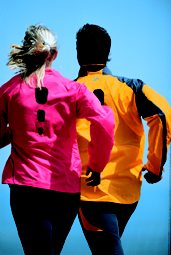Running Top Tips for Beginners

Running
is a great activity and a good way to stay fit, it’s also seen as very
economical in terms of equipment and time. However, it’s important to remember
that it’s a demanding, repetitive and high impact exercise and because of this,
high-risk in terms of the potential for injury.
Being a beginner…
In
an ideal
world, the first thing you would do if you decided to start running would
be to see a physiotherapist to have a biomechanical and postural assessment. Your physiotherapist would be able to tell you if
you have some weakness, tightness or postural dysfunctions which could be a
problem once you start running.
This
scenario is unfortunately very rare. The first time we generally see people is
when they have a problem, usually a pain. However, we can always hope!
These
are my top tips for new runners:
-
See your physio
before you start your running programme!
I
know I’m repeating myself here, however it is definitely worth getting assessed by your
physiotherapist to help avoid bigger issues in the long term.
-
Buy appropriate
running trainers
The
right shoes make a huge difference to your running comfort and reduce the risk
of many running-related injuries. Go to one of the many running stores where
they look at your running gait on a treadmill and then advise you on the best
shoes for you. Your old tennis shoes are just not going to cut it and may do
you harm!
-
Start Slowly
A
good way to start running is to do a few walk/run sessions. It is a good form
of interval training. After a while, you increase the duration of the running
phase and decrease the duration of the walking phase. When you are able to run
all the way through, you can very gradually increase the mileage.
-
Practice
Self-management
Old
wisdom was to stretch before a run but more recent research has advised that a
warm-up should consist of the activity you are going to do but on a gentler
level and generally recommends to save the stretching until the end of your
run. So a brisk 3-5 minute walk should generally be sufficient as a warm-up.
It’s worth saying if you’ve always stretched before running it’s fine to
continue.
Stretching,
using a foam roller and a spiky ball to release tensions and tightness can be
very helpful after a run. This will preserve the elasticity of your muscles and
tendons. After a run, having a cold bath or cold shower on the legs can help to
recover faster from any potential muscle stiffness/soreness.
-
Factor in Rest
sessions in addition to your Training Sessions
It
is very important to be careful not to over train, to have enough time to rest, your body needs the time to recover, to heal correctly after
a run.
-
Increase
the frequency of your run and your mileage gradually.
If you go too far too fast, your body might tell you
to stop by starting to hurt somewhere….
-
Diversity is
important in running
Don’t
just run, adding other cardio activities
such as cycling, swimming, rowing or cross trainer is important so that your
muscles are not always working in the same way and in the same pattern.
Some
strengthening and HIIT circuit sessions will also definitely reduce the risk of
injury. Your physiotherapist can give you a personalised program according to your
initial assessment, requirements and preferences if required.
-
Recognise
a possible injury early
So is it a niggle or an overuse injury?
There is a difference between post running aches and
soreness, and an injury. A good warm-up before a running session and stretches
and self-management after a run will usually get rid of any niggles. Pains
during a run should be treated with suspicion, an early finish and focussing on
your post-running stretch routine is recommended. If you are in any way
concerned, applying ice to the sore area can help any problem deteriorating.
Assessing how you are the following day is often the best indicator if something
might be more of a problem.
Several factors can lead to injury- biomechanics,
running techniques, footwear, type of training, weakness, previous injury
history, nutrition and hydration mistakes…
What kind of injuries could you have caused by
running? The list is long but some general injuries we see are:
·
Plantar fasciitis and heel pain
·
Calf strain and/or shin splints
·
Anterior knee pain (patellofemoral pain
and patellar tendinopathy)
·
ITB syndrome
·
Hip flexors and groin pain
·
Lower back and pelvis pain
· Stress fractures
If something isn’t settling and interfering with your running, come see us and we can help you. An accurate diagnosis is essential for effective treatment and management and getting you back out there as soon as possible.
Happy running!
Francois-Xavier
Armengaud Senior Physiotherapist
Francois-Xavier is a keen runner himself. He successfully completed the Ultra-Trail du Mercantour Côte d’Azur in June this year coming a very respectable 40th out of 200 competitors. He is available Monday to Friday. For further information on any of these tips please get in touch.
"I just want to say thank you for looking after me. I hope - in the nicest possible way of course - that I won't be seeing you again too soon!"
CN




Keep in touch
Established in 1998